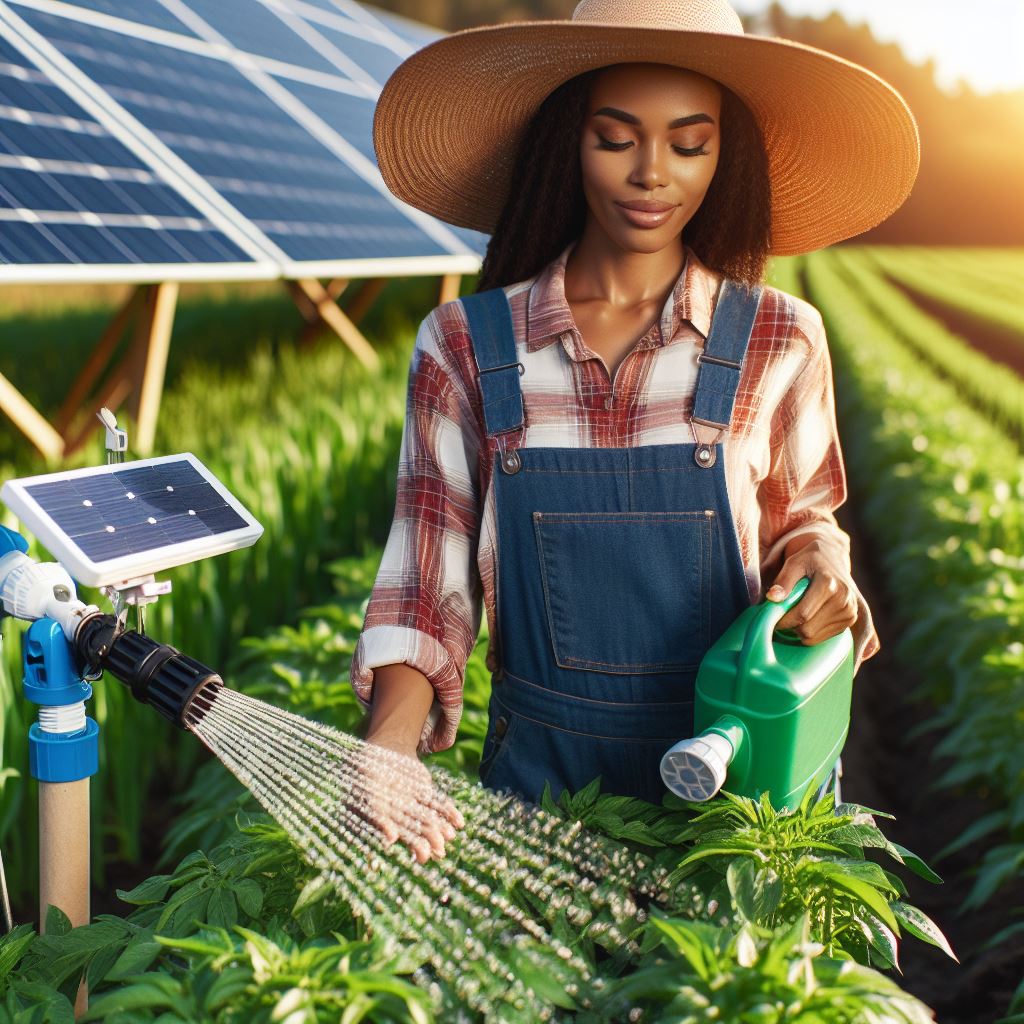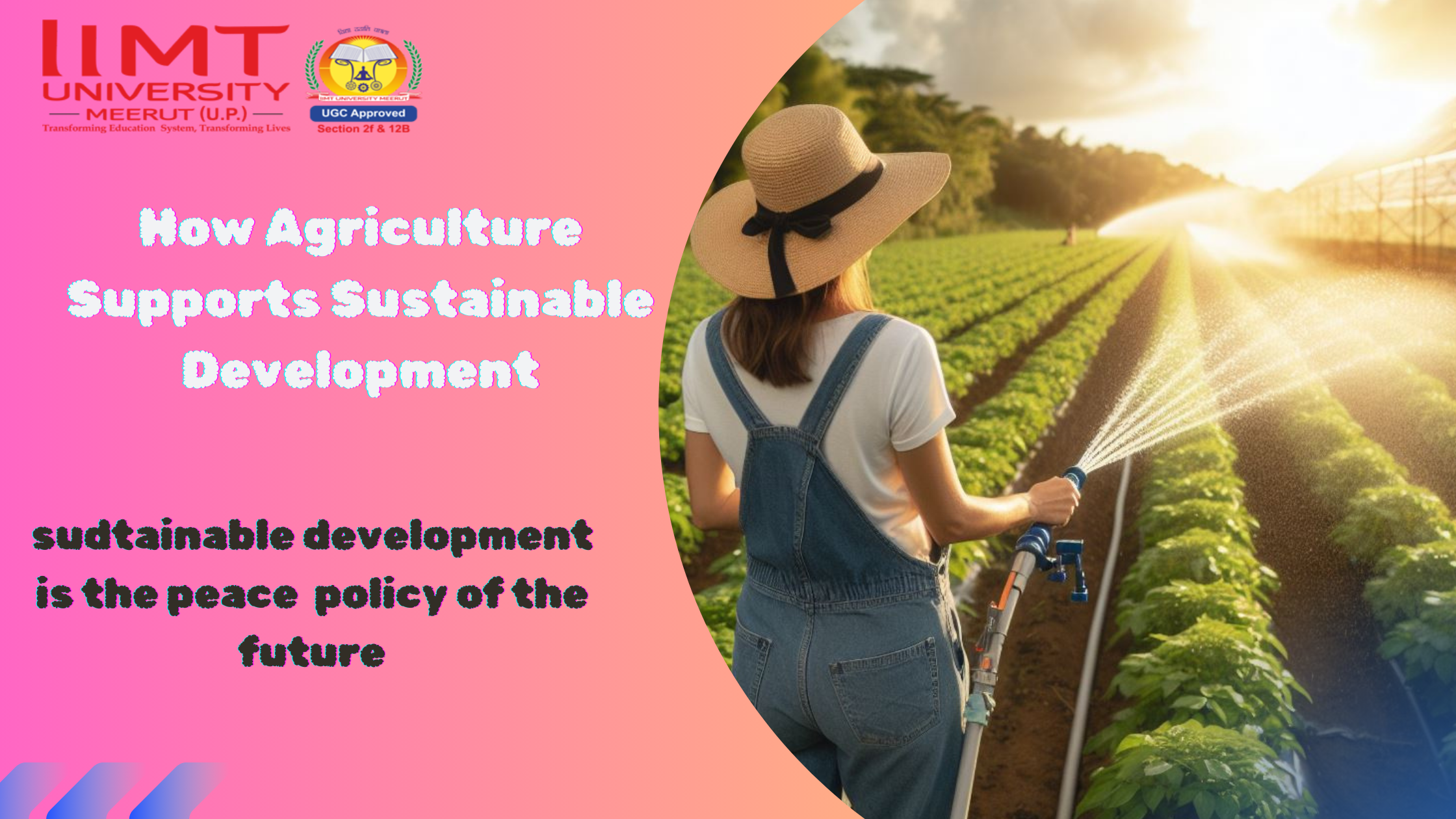How Agriculture Supports Sustainable Development
 Agriculture plays a crucial role in supporting sustainable development by addressing key global challenges and promoting environmental stewardship. Here’s how agriculture contributes to sustainable development:
Agriculture plays a crucial role in supporting sustainable development by addressing key global challenges and promoting environmental stewardship. Here’s how agriculture contributes to sustainable development:
-
Food Security and Nutrition:
Agriculture is essential for ensuring food security by producing nutritious crops and livestock to feed a growing global population. Sustainable farming practices prioritize diverse and resilient food systems, reducing food insecurity and malnutrition.
-
Environmental Conservation:
-
- Sustainable agriculture practices focus on conserving natural resources such as soil, water, and biodiversity. Techniques like crop rotation, agroforestry, and integrated pest management help minimize environmental impact and preserve ecosystems.
-
Climate Change Mitigation:
-
- Agriculture has a significant role in mitigating climate change. Practices like carbon sequestration through agroforestry, reduced tillage, and sustainable land management contribute to lowering greenhouse gas emissions and enhancing carbon storage in soils.
-
Water Management:
-
- Sustainable agriculture promotes efficient water management strategies, such as drip irrigation, rainwater harvesting, and water-saving crop varieties. These practices ensure water availability for agriculture while conserving freshwater resources.
-
Soil Health and Conservation:
-
- Healthy soils are critical for agricultural productivity and environmental sustainability. Sustainable agriculture practices enhance soil health through organic farming, cover cropping, and reduced chemical inputs, preventing soil erosion and degradation.
-
Biodiversity Conservation:
-
- Agricultural biodiversity is vital for ecosystem resilience and food security. Sustainable farming methods preserve native plant species, support pollinators, and maintain wildlife habitats, promoting biodiversity conservation.
-
Rural Development and Livelihoods:
-
- Agriculture is a primary source of livelihood for millions of people worldwide, particularly in rural areas. Sustainable agricultural practices create employment opportunities, improve incomes, and contribute to rural development and poverty reduction.
-
Responsible Resource Use:
-
- Sustainable agriculture emphasizes responsible resource use, including energy efficiency, reduced waste, and recycling agricultural by-products. This minimizes the environmental footprint of farming operations.
-
Community Empowerment:
-
- Sustainable agriculture fosters community engagement and empowerment by promoting participatory approaches, local ownership of resources, and inclusive decision-making in agricultural development.
-
Adaptation to Climate Variability:
-
- Agriculture faces increasing challenges from climate variability and extreme weather events. Sustainable practices like diversified cropping systems and resilient crop varieties help farmers adapt to changing climatic conditions.
By integrating sustainable practices into agricultural systems, we can enhance productivity, protect natural resources, promote equitable development, and contribute to achieving broader sustainable development goals.
Frequently Asked Questions (FAQs)
Here are common questions and answers related to how agriculture contributes to sustainable development:
-
How does sustainable agriculture promote environmental conservation?
-
- Sustainable agriculture practices prioritize soil health, water management, and biodiversity conservation. Techniques like crop rotation, agroforestry, and organic farming minimize environmental impact and preserve ecosystems.
-
What role does agriculture play in addressing climate change?
-
- Agriculture contributes to climate change mitigation through practices such as carbon sequestration, reduced tillage, and agroecological farming. These methods enhance carbon storage in soils and reduce greenhouse gas emissions.
-
How does sustainable agriculture promote food security and nutrition?
-
- Sustainable agriculture ensures food security by diversifying crop varieties, improving soil fertility, and supporting resilient food systems. Access to nutritious foods contributes to better nutrition and public health.
-
What are some examples of sustainable agricultural practices?
-
- Examples of sustainable practices include integrated pest management (IPM), conservation tillage, precision farming, organic farming, water-efficient irrigation, and the use of renewable energy in agriculture.
-
How does agriculture contribute to rural development and livelihoods?
-
- Agriculture provides livelihoods for rural communities by creating employment opportunities, generating income from farming and agribusiness, and supporting local economies through value-added activities.
-
Why is biodiversity important in agriculture, and how is it conserved?
-
- Biodiversity is crucial for pollination, pest control, and ecosystem resilience in agriculture. Sustainable farmers conserve biodiversity by preserving native plants, supporting beneficial insects, and maintaining wildlife habitats.
-
What are the economic benefits of sustainable agriculture?
-
- Sustainable agriculture improves economic resilience by reducing input costs, increasing farm productivity, and accessing premium markets for organic or sustainably produced products.
-
How can farmers adapt to climate variability through sustainable practices?
-
- Farmers adopt climate-smart practices like crop diversification, resilient crop varieties, and efficient water management to adapt to climate variability and minimize crop losses.
-
What role do government policies play in promoting sustainable agriculture?
-
- Government policies and incentives encourage farmers to adopt sustainable practices, invest in renewable energy, conserve natural resources, and participate in conservation programs.
-
How can consumers support sustainable agriculture?
-
- Consumers can support sustainable agriculture by choosing locally produced foods, organic products, and fair-trade goods. By making informed purchasing decisions, consumers contribute to sustainable food systems.
Understanding the linkages between agriculture and sustainable development is crucial for building resilient food systems, conserving natural resources, and promoting inclusive economic growth.
To know more – Visit our Website
For admission related queries – Click here or call us @ 9997089170
Author :- Davesh

